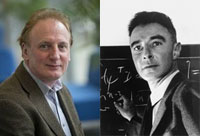By Margaret Harris

Ray Monk (left) on the enigmatic J Robert Oppenheimer.
The American physicist J Robert Oppenheimer has been the subject of many biographies. It’s easy to see why. As the scientific director of the Manhattan Project, Oppenheimer presided over one of the most important events of the 20th century: the development of the first atomic weapons during the Second World War. Not long afterwards, he became a prominent victim of another key moment in history: the anti-communist “red scare” that swept the US during the 1950s. And on a personal level, he was a learned and cultured man – one who quoted his own translation of the Hindu scripture Bhagavad Gita (“Now I am become death, the destroyer of worlds”) when asked how he felt after the first test of the atomic bomb.
So, basically, Oppenheimer is catnip for biographers – but as Ray Monk discovered, writing about him also poses some challenges. Monk, a philosopher at the University of Southampton in the UK, has recently written a book called Inside the Centre: A Life of J Robert Oppenheimer. In this new edition of the Physics World books podcast, you’ll hear him talking about the book, about Oppenheimer, and about the 11 years he spent trying get to grips with Oppenheimer’s complex physics and no less complex personality. Amazingly, even after all that time, Monk says that he still finds Oppenheimer absolutely fascinating – and if you listen to the podcast, I think you’ll understand why.
You can listen to the podcast here or download it via this link (right click to save file, 15.4 MB).
It is quite incomprehensible to go on singing about the same narrow circle of people who undoubtedly were good physicits and ignore a large number of other good physicists with equally fundamental contrbutions.
I don’t know if Oppenheimer was enigmatic, but he was indeed a very interesting “multidimensional” person. It’s a good exercise to compare the personalities of those involved in building up the physics of the first half of the 20th Century, and who were also involved in the Manhattan project, such as Bethe, Fermi, Teller, Wigner, Rabi, etc., and I’m sure you won’t come up with anyone as rich as Oppenheimer. Someone who could be mentally unstable, and yet focused enough to lead on of the most complex science and engineering endeavors. Someone who used to cheat, and yet remain loyal to his dearest ideals. Above all, his cultivated nature. In a way, it is understandable that he isn’t so much known because of his physics, since it was the great drama that always surrounded him that made him famous. The others mostly had their physics.
The over glorification of Oppenheimer via the process of enigmaticisation is quite a bit “loaded operation” that always spins around a very restrainte circle knowing fully well that many other physicists had also interesting sides beyond physics.
I think that it is very important that books continue to be published about ground breaking scientists like Oppenheimer. The younger generations like myself need to be reminded of not only his enormous WWII contributions, but also his guidance in the Atomic Energy Commission, and his continued lengthy physics work. Although the Manhattan project was undoubtably his crowning achievement, his peacetime business must never be forgotten. As one of America’s greatest physicist, I also hope the books tell of the injustice our government showed him during the Red Scare. In my own physics class, I hope Oppenheimer is discussed, and his work made known to the class level.